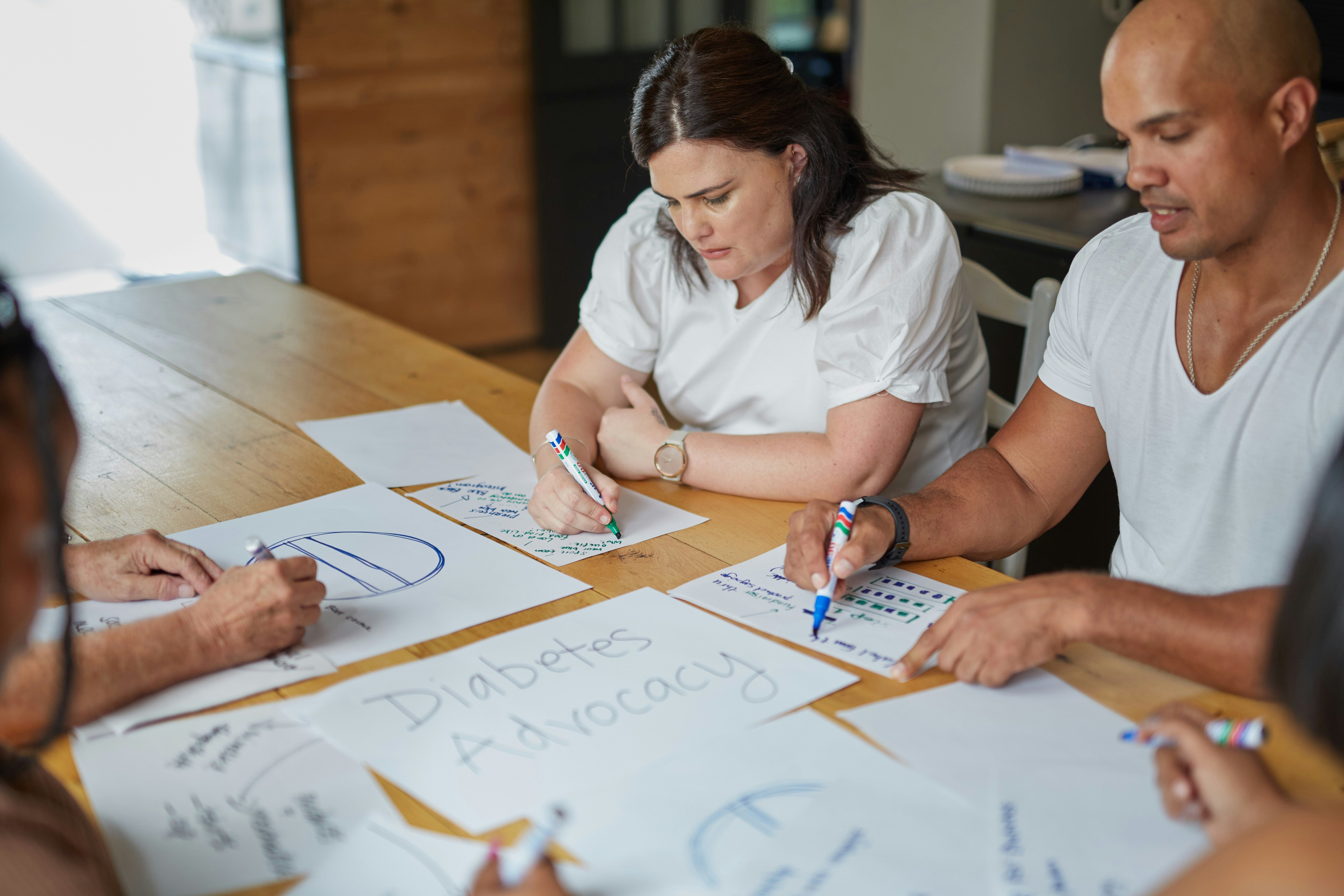"There was constant stress 24/7 leading to mental burnout. We just have to be adaptable and resilient because diabetes is exhausting."
Did you know that people living with Type 1 diabetes (T1D) make an estimated 180 health-related decisions every day? Whether it’s deciding how much insulin to take, what to eat, or whether it’s safe to exercise, these constant choices require vigilance and resilience. Managing T1D is more than just blood sugar levels—it’s about balancing these decisions with the rest of life while maintaining well-being.
Diabetes Burnout is Normal, You are Not Alone
Living with T1D is demanding, and it's normal to experience periods of burnout. In fact, more than 90% of people with diabetes experience burnout at some point in their lives. The constant monitoring, calculations, and unpredictability can feel overwhelming, leading to mental and emotional exhaustion. It's important to remember that you're not alone—many others are navigating these same challenges, and it's okay to ask for help or take a step back when you need it.
Let’s break down some of the decisions and lifestyle factors that can make living with diabetes challenging on our mental health. Then we’ll explore tools, resources, and tips that can help make life with diabetes simpler.
The Weight of Constant Decision-Making
With T1D, every day involves numerous decisions that impact our health. Some of the most common decisions we heard during our interviews included:
- Evaluating whether to start, switch, or continue with specific management devices, such as insulin pumps or continuous glucose monitors. These decisions involve understanding the benefits, limitations, and potential impact on our day-to-day management, and can often feel complicated or overwhelming.
- Accurately assessing the contents of our meals and determining the appropriate insulin dose. From carb counts to meal timing, each factor plays a role in keeping our glucose levels stable, requiring a great deal of thought and awareness.
- Strategically planning the timing of our workouts to maintain glucose stability can be challenging. Exercise has both immediate and long-term effects on blood sugar, and finding the right balance between activity and glucose control often takes trial and error.
- Making choices about whether to engage in social situations or enter environments that might induce stress or bring unexpected challenges. These decisions can have a significant impact on our mental and physical health, as social dynamics and stress levels can directly influence blood sugar control.
These decisions can be tough to balance, and it's completely normal for us to feel overwhelmed by them. A high or low blood sugar reading isn't a personal failure—it's a reflection of countless variables, many beyond our control.
Why Celebrating Small Wins Matters
Amidst the daily decisions, it’s easy to overlook small wins—those moments when we make a good choice, prevent a low, or simply take care of ourselves. Celebrating these wins helps shift our focus from what went wrong to what went right, reminding us that every effort is valuable.
Celebrating small wins also builds resilience. When we acknowledge our successes, we reinforce positive behaviors and motivate ourselves to keep going. Every step forward, no matter how small, is progress worth celebrating.
Tools to Help Reduce the Mental Load
We are fortunate to live in an age where diabetes technology is rapidly advancing, making life with Type 1 diabetes simpler. Here are a few tools that can help reduce the mental load of managing diabetes:
- Continuous Glucose Monitors (CGMs): CGMs are wearable devices that automatically track blood glucose levels throughout the day and night. By providing real-time data and alerts, CGMs reduce the burden of constant finger-pricking and help users make informed decisions without needing to guess their glucose levels.
- Insulin Pumps: Insulin pumps are small devices that deliver insulin continuously, making it easier to manage blood glucose levels without frequent injections. By automating insulin delivery, these pumps help minimize the mental effort of remembering and administering insulin doses.
- Fitness Trackers: Fitness trackers monitor physical activity, which is crucial for maintaining stable glucose levels. They help users track sleep and workouts to better understand their lifestyle and incorporate healthy habits into their routine.
- GlucoSense: GlucoSense is an app designed to simplify diabetes management by providing personalized insights, glucose forecasts, and reflections. With features like automatic syncing with fitness trackers and AI-powered carb estimates, GlucoSense helps reduce the mental load by offering clear, actionable information, so users can make decisions with confidence and focus on living their life.
Everyone is different, and not every tool or device will be the right fit for your individual needs and goals. It's essential to find what works best for you and your lifestyle. Always consult with your healthcare provider before making changes to your diabetes management plan to ensure it aligns with your specific needs.
Additional Resources to Reduce the Mental Load
Managing Type 1 diabetes can be overwhelming, but there are resources available to help lighten the mental burden.
- Certified Diabetes Care and Education Specialists (CDCES) are healthcare professionals who are specially trained to support individuals with diabetes. They provide personalized guidance on managing blood sugar, adjusting treatment plans, and addressing the emotional aspects of living with diabetes. Working with a CDCES can offer practical solutions and emotional support, helping to make diabetes management more manageable and less isolating.
- Finding mentors or peers who understand what you’re going through can be incredibly empowering. Online communities, such as social media groups, can offer a sense of belonging and shared understanding, while local community networks can provide in-person support and camaraderie.
Tips for Managing the Mental Load and Celebrating Wins
- Acknowledge Your Efforts: Give yourself credit for the things you do well, whether it’s calculating an insulin dose or taking time to rest.
- Set Small, Achievable Goals: Instead of striving for perfection, set manageable goals like going for a walk or drinking enough water.
- Track Your Wins: Write down your wins. Tracking them can help you see your progress and boost morale.
- Use GlucoSense to Stay on Track: The GlucoSense app makes it easy to track progress, see patterns, and validate your efforts through features like GlucoScore.
- Connect with Others: Sharing your wins with family, friends, or the T1D community can amplify the positivity.
Finding Balance in the Mental Load
Living with T1D means managing a complex set of responsibilities. By celebrating our wins, we can create a more positive experience. It’s not about achieving perfection; it’s about recognizing our resilience and effort each day.
At GlucoSense, we understand the mental load of T1D and are here to support you every step of the way. With tools that help you track your progress, validate your intuition, and celebrate your successes, we aim to make the journey a little lighter. In our next article, we’ll explore how building connections and finding support can make all the difference in navigating life with T1D. Stay tuned for more insights and encouragement from the T1D community.




